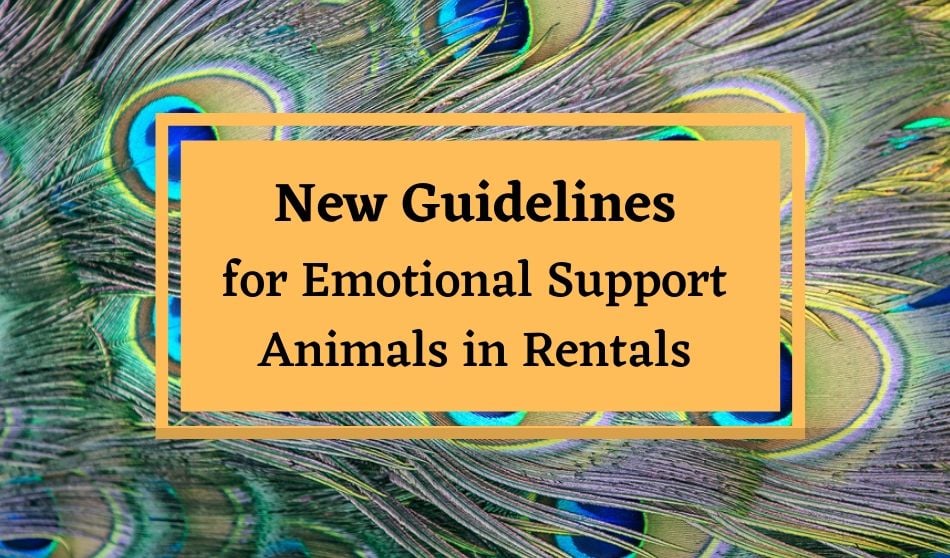
When it comes to letting an emotional support animal fly, the airline industry has been in a balancing act between accommodating the needs of an individual with those of the collective passengers on board.
The phrase ‘when pigs fly’ has new meaning when you consider the types of animals that have been airborne.
It hasn’t been unheard of for emotional support miniature horses to fly. Other non-traditional support animals such as ducks, snakes, cats, and monkeys have taken to the sky. These special accommodations come with risks regarding property damage as well as health and safety. A few years back an emotional support peacock was denied a seat on an airplane for that reason.
Landlord Concerns for Allowing Pets in a Rental
It’s no different for the rental industry. Landlords have a concern that animals will cause damage to the rental unit. They may also harm other residents, and/or cause health issues if not cared for properly. In that, many landlords have established either strict pet policies that cover type, breed, behavior or have gone so far as to ban pets altogether.
As a landlord, understand that although your property may be ‘pet-free’ or there are breed or other restrictions, under the Fair Housing Act (FHA), a reasonable request for a service or emotional support animal (ESA) must be entertained.

A German Shepard might be on your breed restriction list for a pet. However, a service animal may be any breed unless it has shown itself a direct threat to others.
HUD New Guidelines for Reasonable Accommodation Requests
The US Department of Housing and Urban Development (HUD) has just released new guidelines on handling those reasonable accommodation requests to help landlords and property managers with those obligations.
The document indicates that the most HUD charges of discrimination are against housing providers denying reasonable accommodations. It goes on to say FHA complaints regarding denied reasonable accommodations are up 60% and are on the rise.
They anticipate that these new guidelines will help landlords understand their obligations and set best practices for addressing requests while reducing the number of discrimination claims and complaints.
The new HUD guidelines cover how to assess a person’s request to have a service animal as a reasonable accommodation under the FHA and includes:
- Understanding what is and isn’t an emotional support animal and/or service animal
- The two important (and ONLY) questions to ask someone requesting a service animal
- Request analysis for assistance animals other than service animals
- Criteria for assessing whether to grant requested accommodations
- Types of animals including unique animals for unique circumstances
- Best practices for documenting an individual’s need for an assistance animal
They highly advise reading the new HUD guidelines together with the Reasonable Accommodations Under the Fair Housing Act Joint Statement of The Department of Housing and Urban Development and the Department of Justice located here: https://www.hud.gov/sites/documents/huddojstatement.pdf
Note: An Emotional Support Animal (Service Animal) is Not a Pet
The nuances in lingo surrounding this topic can be confusing. For instance, take these common terms that have been often used interchangeably:
Emotional support animal
Service animal
ESA animal
Assistance animal
ADA service animal
Guide animal (such as a guide dog)
Comfort animal
Psychiatric service dog
What the list above holds in common is that none of the above are considered pets when acting in a capacity to assist individuals with disabilities. In other words, pets can be trained to perform tasks. However, the main purpose of a service animal (regardless of the term given) is to provide a service for someone with a disability.

A trained service animal can be a huge asset providing valuable assistance with tasks around the home.
The Department of Transportation (DOT) disability upcoming rulings propose to change the definition of a service animal in the Air Carrier Access Act (ACA) to match the American Disability Act (ADA) to allow only trained service animals aboard airplanes in the future.
As a result, these future DOT rulings may impact how HUD moves forward with FHA guidelines in the distant future. In the meantime, this newly released document with current guidelines will help landlords and property managers in assessing and handling those reasonable accommodation requests today.







Are there plans to add a channel manager to rentec and support Short Term Rentals?
Hi Tom!
Although originally designed for long term rental housing, we are always adding customization settings and I am amazed at some of the creative ways clients have used the software, including tracking income and expenses for short term rentals. For instance, the software allows customization of terms such as changing the word ‘rent’ to something more suitable or changing ‘Tenant’ to ‘Guest’. It also allows charging daily, weekly, bi-weekly rent rate options and modifing notifications on the Summary tab.
To your question, I haven’t heard a discussion to add a channel manager or specific short term rental tools but am happy to pass along your comments to the team. If you haven’t already, signing up for the blog newsletter will bring product updates and useful information to your inbox. If you are a client, that information is also provided on your Summary tab.
Going forward, for faster answers feel free to reach out to our Success or Business Development teams by email (success@rentecdirect.com) and calls (800-881-5139) or chat during business hours. For our clients, the ‘Need Help’ button at the top or bottom throughout the software allows you to either search the Knowledge Base for answers and/or ask a question that goes directly to the Success Team.
Thank you for reaching out!
I been at my current resident for exactly one year. I got My two pets my Chihuahua and my cat one night into my rental. I have not sign the lease but have not for the whole year. I’ve had my animals my cat and dog for 11 months living at my apartment. And now my landlord is trying to say I have to pay for $100 $200 a piece for a pet fee for a total of $400. I did not say I’m least all this time and be the resident for a year exact and having my pets here for 11 months is it legal for her to demand I pay $400 pet fee?
If I don’t pay to me at least then I will be getting evicted.
How many ESA are permitted in a rental unit? Can someone claim 3 or 5
Great question Claudia, Although the law isn’t explicit on the number of ESA, the basic requirements for a reasonable accommodation would still be the same when dealing with multiple emotional support animals. Each animal is a separate accommodation request. So, if a person claims a need for multiple animals for emotional support, then they would need to provide documentation from their doctor or medical professional that the additional animal alleviates a symptom of the patient’s disability.
If you live in a HUD housing complex can the person tell you you need to get a cat if you got an esa letter to get a dog?
Hi Danielle, I can’t offer legal advice but can say that there are some exceptions where a landlord can deny an emotional support animal. You can find those exceptions here: HUD Assistance Animal | Obligations of Housing Providers
If you live in a HUD housing complex and you get free entertainment that goes with the rent, can they not allow you to participate with your emotional support dog. They have all the ESA paper work from the physician. She is a less than 9 lb. , 11 year old very well behaved animal. I am willing to take full responsibility for her.
Judy, I’m not sure I understand what you mean by ‘free entertainment’ that you’d like your emotional support dog to participate in with you. I’m guessing some amenities and activities might be difficult to accommodate but I’d need a little more context. Can you provide more details and include the state you’re in as some states may have more lenient regulations.
I have a one year old golden retriever as an ESA and my landlord has denied my request to live with ESA. What should I do now?
Hi Josaph, You should contact an attorney or reach out to your local housing authority, who will help you draft a letter letting your landlord know your rights in regards to your ESA.
Josaph what was the reason for denial? Read HUD notice FHE0-2020-01
Can someone have 4 ESA dogs in an 80 sq ft one bedroom condo?
Good question, Thom! The law isn’t explicit on the number of ESA, but the basic requirements for a reasonable accommodation would still be the same when dealing with multiple emotional support animals. Each animal is a separate accommodation request. So, if a person claims a need for multiple animals for emotional support, then they would need to provide documentation from their doctor or medical professional that the additional animal alleviates a symptom of the patient’s disability.